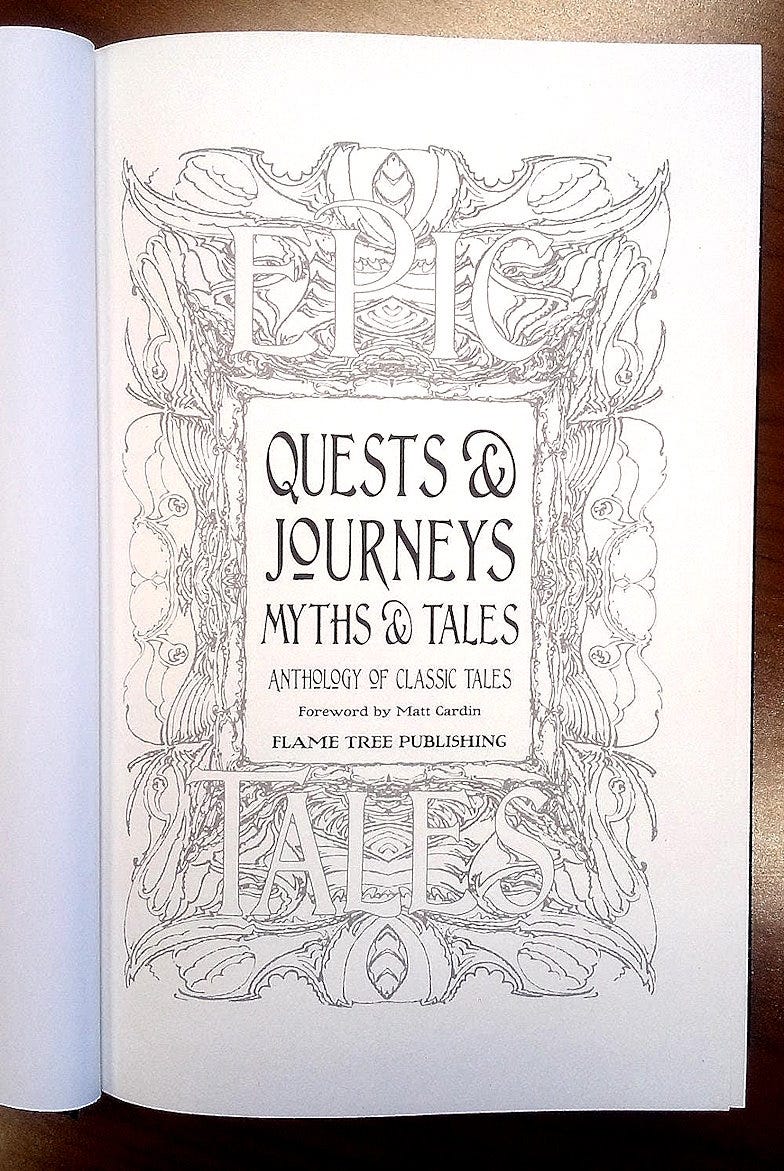Dear Living Dark reader,
Have you ever felt the tug of a story that seemed to speak directly to your soul, to the unspoken longings and questions that reside deep within? What is it about tales of quests and journeys that resonates so profoundly with us across cultures and across time? Could it be that these stories are more than mere entertainment, that they hold up a mirror to our own lives and the universal human experience?
Earlier this year, I was invited by Flame Tree Publishing to write the foreword to a global anthology of quest myths that they were developing. I was already familiar with Flame Tree, having written the chapter on fantasy and horror in the 1960s and 1970s for their Astounding Illustrated History of Fantasy and Horror, and having enjoyed browsing through their gorgeously produced books whenever I have come across them in bookstores. So I gladly accepted. (It also wasn’t hurtful to my motivation that they told me I had been recommended for the job by another writer whose work has been deeply important to me for more than two decades.)
These six months later, Quests and Journeys: Myths and Tales is now available. Presenting “a powerful cycle of stories from many mythologies, from Greek to Norse, Japanese to Slavic,” it is the newest addition to Flame Tree’s Epic Tales and Gothic Fantasy collections, which “bring together the entire range of myth, folklore and modern short fiction.”
Here is the cover:
Here is the official description:
Quests and journeys are fundamental to many mythologies, often reflecting the human desire for knowledge and understanding. In Sumerian and Babylonian legend we find Gilgamesh seeking immortality; from the Norse, Odin sacrifices his eye in his quest for the utmost wisdom; from Greek mythology comes Jason and the Argonauts and Odysseus. And there are recurring themes, with heroes yearning for their loved ones in the underworld or to defy death, so from Japan comes the tale of Izanagi searching for Izanami in Yomi, the land of shadows and the dead; and from Polynesia, the god Māui's fateful journey to the belly of the Goddess of the Underworld in order to find immortality. And of course, from Arthurian legend, the search for the Holy Grail brings profound self-discovery to the knights Bors, Percival and Galahad. This new collection is a wonder of tales from every corner of the world.
Here is my personal copy, which recently arrived in the mail:
And below, with Flame Tree’s blessing, is the full text of my foreword. As you’ll see, it intersects with the questions I raised above about the profound spiritual attraction and meaning of quest narratives, and also with the focal themes of creativity, nonduality, and spiritual self-understanding that we pursue here at TLD.
Warm regards,
Foreword to Quests & Journeys: Myths & Tales
by Matt Cardin
The implicit appeal of tales of quests and journeys—an appeal beyond their surface attraction as exciting stories—is that they operate on multiple levels. In doing so, they speak to the reader’s or hearer’s personal, existential concerns. Even as they entertain on one level, on another level they evoke some of the most profound and poignant emotions and intimations in all of human experience.
Such stories are always, ultimately, about more than just the events and characters they portray. They are not even primarily about these. Rather, they are about the reader. They are about the unchosen journey the reader was set upon by the sheer fact of being born, and they are about the quest the reader was assigned by the sheer fact of being born as a self-conscious creature that automatically, helplessly feels incomplete and therefore searches for the answer to the riddle of its existence, the mystery of its appearance as a separate presence, a singular subjectivity confronted by an outer, objective world into which it has been cast, and with which it often finds itself at odds, and within which it must find the reason for its existence. The primal, unchosen journey invoked by any tale in this vein is the journey from nothing to something and then back again—from birth, through the world, to death. The primal quest is to find out why this experience should have happened at all: the answer to who one actually is, and what the world is, and what one is supposed to be doing here, and how to locate the object of that implanted sense of numinous yearning, and even whether—dream of all dreams—it might be possible to forestall or eliminate the seemingly surefire end point of annihilation.
“Quest stories are about the reader. They are about the unchosen journey the reader was set upon by the sheer fact of being born.”
Again, this is what stories of quests and journeys invoke beyond their surface elements. They metaphorize the reader’s life situation, both its subjective and objective aspects, and they depict its outworking and resolution in a multitude of different narratives, terms, and cultural iterations.
There is also another division into levels or layers that likewise parallels the reader’s life. It is one that skilled storytellers around the world have always known. Today it is the purview of novelists, screenwriters, and game writers, who have honed it to a fine point and deployed it en masse in the multitude of fictional narratives that now pervade our lives. The principle is simply this: All quests and journeys are both outer and inner. The quest for an external object is simultaneously a quest for an inner object. A story’s outer events are always a mutual reflection of its protagonist’s inner search. Importantly, this is not separate from, and in fact it is an aspect of, the first principle.
A journey through a world of adventure, conflict, loss, love, and all the rest is a journey through the landscape of the protagonist’s soul. The events and experiences that make up the story of a Ulysses struggling for ten years to return to Ithaca, or a Percival questing for the Holy Grail, or a Sindbad seeking adventure and riches on the high seas, are simultaneously the chronicle of an inner journey toward some altered state of being, some shift of personal character, some realization, some attainment of wisdom or insight, whether of the nominally positive or negative sort. In some classic tales, such as those of Gilgamesh and Maui, the quest is for immortality itself, and there is essentially no distinction between outer and inner, surface text and subtext. In all cases, the dual journey intertwines with the fact of the reader’s involvement, as described above, to make such stories a chronicle of the reader’s inner quest. When the alchemy of storytelling is activated at its highest pitch, this can result in a deeply moving sense of simultaneous revelation and confirmation. Contemporary storytellers with their narrative codification of this principle are simply continuing an ancient tradition, one as old as the art of telling stories at all.
“All quests and journeys are both outer and inner.”
These principles are important aspects of the powerful, perennial fascination we feel for tales of quests and journeys. But of course one does not have to think about them while reading the stories themselves, nor is it advisable to do so. On a much simpler level, there is the winsome attraction of the surface story itself, the sheer pleasure of adventure, romance, and so on, the enjoyment of accompanying colorful characters on dramatic, dangerous, passionate, frightening, humorous, epic, entertaining trips. This is the basic level at which we approach any story, and unless we are scholars or philosophers who come bearing an explicitly analytical intent, it is the level at which we are best advised to read them.
In fact, those other, “deeper” layers of meaning and engagement are most deeply felt, and are most powerfully effective, when we leave them to work on their own, beyond our peripheral vision, in the shadows of the unconscious mind, instead of straining to see and know them consciously. So, we read the story, hear the narrative, engage the adventure, let ourselves get swept up in the enjoyment and fascination of it all. Meanwhile, secret things are happening in our soul, in parallel with the protagonist’s inner journey and the story’s symbolic unfolding. This marriage of soul between the reader/hearer and the story is an ancient meta-tale in itself: the tale of telling ourselves, of storytelling as a means and manifestation of our individual and collective quests. When we engage with the global tradition of such stories, we rehearse, and we mythically inform and enrich, the story of our own origin and destiny, of the journey we are each called upon to make, which we have no choice but to make, through an outer/inner world on a quest for the knowledge and happiness—ultimately inseparable, ultimately the same thing—that constitute the answer to the riddle of our lives.
Quests and Journeys: Myths and Tales (Flame Tree Publishing, 2024) is available from the publisher and in bookstores everywhere.









I think what contributes to the perennial attraction of quest myths is also the more or less implicit notion that the object of the (inner and outer) search itself is transfigured along the way, it (together with the searcher) reveals itself as Something defeating expectation, and is eventually left behind as new horizons disclose uncharted highlands for the journey to continue.
A possible illustration of this is Lovecraft's Dream Quest of Unknown Kadath or Dante's reimagining of the story of Ulysses in the 26th canto of his Inferno: after finally returning to Ithaca, the hero leaves again with a few companions, as not even his son's, his old father's and especially Penelope's love "could extinguish within me the ardour I had to gain experience both of the world, and of the vice and worth of men; but forth I put upon the deep and open sea with but a single ship...".
This leads me irresistibly to the thought that no single experience or final realisation, no Apocalypse can possibly conclude and forever seal up the manifestation of being, whose glorious inexhaustibility will at the appointed time surpass death itself, and is, in Fichte's words, "the imprint of our being destined for eternity".
Thank you, Matt. This sounds like a book I must have. I've been questing all my life.